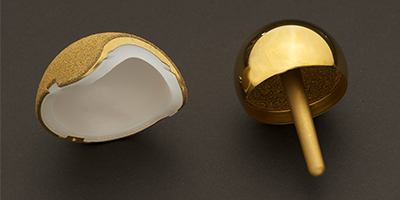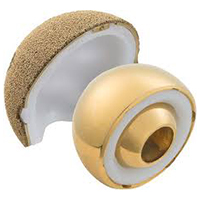Joint Replacement for Metal Sensitive Patients

Patients who have metal allergies or sensitivities may have concerns about the implants used for joint replacement, which are typically made of titanium or cobalt chromium metal alloys. Fortunately, Dr. Pritchett has options for these patients that can help with metal sensitivity issues and may also provide superior wear characteristics over traditional metal implants.
Dr. Pritchett has practiced in the Seattle area for over 30 years. He is heavily involved in research to continue to improve upon joint replacement implants and techniques. His ultimate goal is to help patients suffering from joint pain and arthritis return to their normal activities, and to contribute to advances in technology, techniques, and implants that can improve upon long-term results for patients.
How Can Metal Allergies or Sensitivities Affect Joint Replacement?
If a patient has a metal sensitivity or allergy, there is concern that using a metal joint replacement implant may cause a negative reaction that could lead to the need for a revision joint replacement or a compromised result.
Joint replacements are designed for low friction movement but they still shed tiny particles of metal with use. Tissue reactions to this implant wear debris can be a reason for joint revision surgery. However, patients with metal allergies or sensitivities may react more strongly to these metal particles. For these patients, the new joint becomes inflamed and painful, even though issues like infection, implant wear and loosening have been ruled out.
If a patient has a known metal allergy, Dr. Pritchett recommends “metal-free” implant options. If a patient is concerned about metal allergy or sensitivity, metal allergy tests can be done but most patients are best served by looking at alternative implant options.
What Joint Replacement Options Are Available for Patients with Metal Allergies?

Dr. Pritchett offers ceramic-coated implants for hip replacement and resurfacing, knee replacement, and shoulder resurfacing. The implants are made of titanium metal for strength, and the ceramic coating covers the portions of the implant that are exposed to the soft tissues in the body and the bearing surfaces where movement occurs. The ceramic coating is expertly applied to a carefully prepared and polished surface. Fully ceramic implants can fracture but ceramic coated implants will not, so they are the safest and best material to use.
The implants themselves are identical to normal hip, knee and shoulder implants, except that they have a ceramic coating. The polyethylene (plastic) spacer is still used between the joint components--Dr. Pritchett does not recommend ceramic-on-ceramic joint replacements. Dr. Pritchett has used ceramic-coated implants in his practice for over 25 years with great success. These ceramic-coated implants have also been used in numerous studies that Dr. Pritchett has conducted over the years.
If a patient has a metal allergy or is concerned about potential issues with metal implants, Dr. Pritchett recommends ceramic-coated implants. For shoulder resurfacing procedures in particular, the ceramic-coated implants perform quite well because they articulate directly with the shoulder socket. For this reason, Dr. Pritchett frequently uses ceramic-coated implants for shoulder resurfacing even if metal allergies are not a concern.
Dr. Pritchett also uses ceramic-coated implants for most hip resurfacing cases. For total hip replacement and knee replacement cases, Dr. Pritchett typically uses ceramic-coated implants if there is a concern about metal sensitivity.
What Are the Benefits of Ceramic-Coated Joint Replacement Implants?
Having used ceramic-coated joint replacement implants for over 25 years, Dr. Pritchett has noted that ceramic-coated implants have superior wear characteristics compared to metal implants. This means that the implants may last longer than traditional joint replacement implants.
All hip, knee, and shoulder implants will create some degree of debris over time with wear. However, the wear on ceramic implants tends to be less than that of metal implants. Additionally, there is currently no scientific research suggesting that patients react negatively to ceramics, whereas there is scientific research documenting patient reactions to metal debris.
In terms of cost and the procedure, there is no difference to the patient if ceramic-coated implants are used instead of traditional implants.
Joint Replacement Options for Metal-Sensitive Patients in Seattle, WA
Dr. Pritchett has been heavily involved in the research of joint replacement implants and techniques over his 30-year career in orthopedic surgery. Dr. Pritchett has used ceramic-coated hip, knee, and shoulder replacement implants in his practice for over 25 years, and has seen great results. While ceramic-coated implants are a great option for patients with metal allergies, they can offer benefits to all patients with their superior wear characteristics.
If you would like to schedule a consultation with Dr. Pritchett, please email susan.knudson@swedish.org or use our Appointment Request form.
Specialties
- Hip Replacement
- Hip Resurfacing
- Hip Resurfacing Videos
- Partial Knee Replacement
- Knee Replacement Surgery
- Shoulder Resurfacing
- Total Shoulder Replacement
- Outpatient Joint Replacement
- Joint Replacement for Metal Sensitive Patients
- Surgery for Nerve Injury
- Superior Approach for Hip Implant Surgery
- Two Operating Rooms
- Robotic Assisted Surgery
